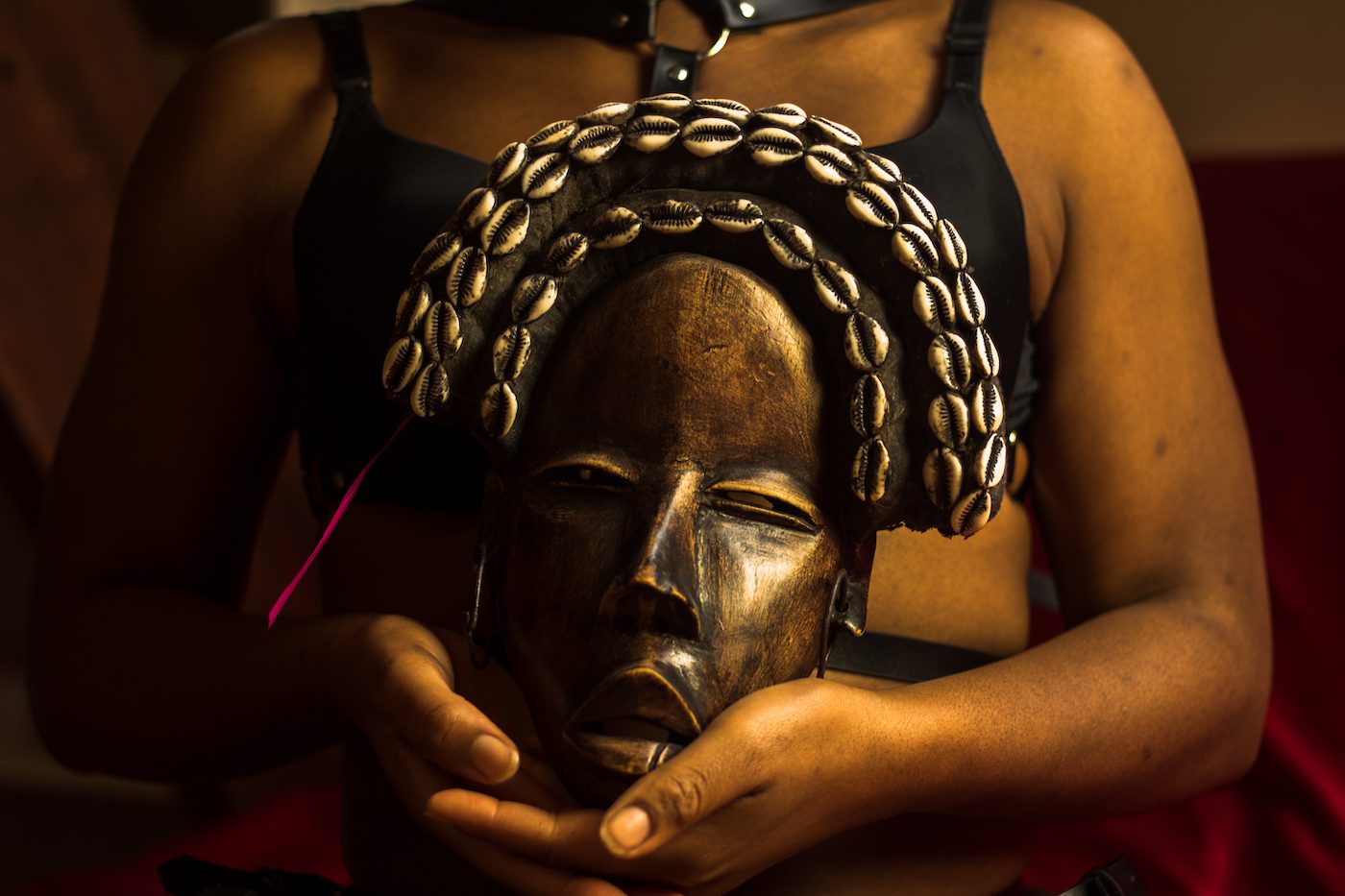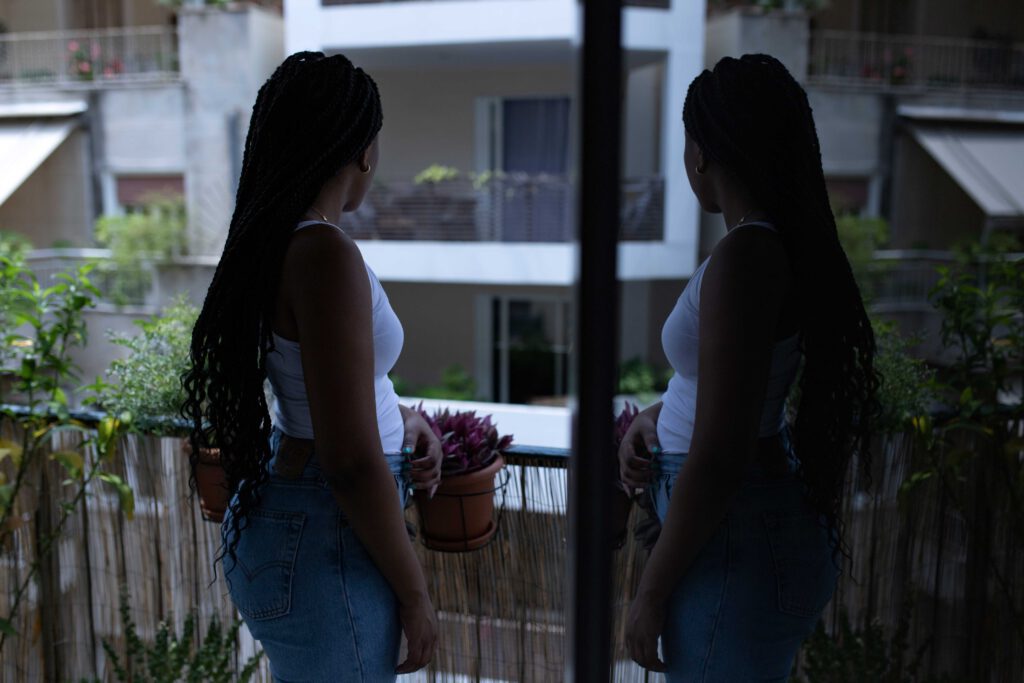The filmmaker upholds experiences of being Black and Greek and creates an archive for the community and for generations to come.

Adéọlá Naomi Adérè̩mí, Aurélie, 2021. Courtesy the artist.
Contemporary And: Can you tell us how you became an artist?
Adéọlá Naomi Adérè̩mí: I’ve always created. I’ve always written poems; I’ve always read books and written. Before my grandmother passed she found a stack of my journals, and they go back to when I was five. And as a kid I used to join my uncle when he would develop his films. But I consciously started using those creative skills when I was twenty-five.
C&: Your latest project is the documentary film I am Afro Greek, on the lives and lived experiences of Black people in Greece. Do you use film as a medium of representation? And in your opinion what is the reason for the near invisibility of Afro Greeks, even though there are so many?
ANA: The film is a collective project and we chose film as a medium because it lasts forever. No one can erase your picture or whitewash it. We wanted to do something that remains in history, that can be digitized but also archived for the generations to come. It’s about seeing and naming yourself for yourself and others.
Invisibility is a very double-edged sword, when you come from an allegedly homogenous white country, that is Greece. I say allegedly, because it’s not true. Greece has always been a migration country. But when it comes to internalized structural white superiority, through media, through art, we as Black people have never been represented. Greek society chooses willingly not to see us, which is structural racism.

Adéọlá Naomi Adérè̩mí, ‘I am Afro Greek: Black portraiture in Greece, film still, 2021. Courtesy the artist.
One of the core reasons I wanted to do this film came out of a New Museum residency with dream hampton and John Akomfrah, called IdeasCity Athens, in 2016. The people from the museum were telling them that there are no Black people in Athens – right in front of me they said that we do not exist! It was John Akomfrah who told me to use my art to present myself and my community, no matter what the institutions are saying about us. So I wrote the film, interviewed people, and did the whole production. The film is collective: Here we are! You will see us whether you want to or not. Everybody came together to make it possible. It is a gift from Afro Greeks to Afro Greeks.
C&: You are using the self-determination “Afro Greek” to capture the shared experiences and histories of Black people in Greece. What does the term express for you?
ANA: The term Afro Greek is super new. I can’t really pinpoint who was the first person to use it, but I am the first to make art or a film about it. We started using it around 2015 to 2017 as a term to express the experience of being Black and raised or born in Greece, of having our formative years in Greece and identifying as Greek citizens legally and culturally. We are Greek and African. But this kind of multiplicity of identity is shunned. We live in a world of binaries where people must be one or the other.
C&: Considering that you are still living between West Africa and western Europe, how has your experience of different life realities influenced your work and your view on belonging?
ANA: I always feel like I belong wherever I choose to belong. I grew up in different parts of West Africa and I am Nigerian and Greek by nationality. My formative years were not spent in Nigeria, they were spent between Niger and then Greece. I’m thirty-four years old now and I have spent most of my years in Greece. But I also feel at home in West Africa because of my ancestral heritage, and because I can make my own realities.
There’s this term people use, second-generation migrants, but you don’t inherit your parents’ migration status. If you are born here, you are from here. Nationality and borders are all fluid, but belonging is something you get to determine yourself. You can lose a nationality, but you don’t lose where you feel you belong. This is what has shaped my thoughts and my beliefs about myself and about the world, and the way that I treat other human beings.
C&: How did you fund the film?
AND: The film wouldn’t have been possible if my community had not supported it. It was a conversation we all had, and we keep on having, about how somebody needs to document us. Somebody needs to archive our experiences and write about us in history.
We shot the entire production in one week. I self-funded everything, the film, the trips, the production – and after a lot of networking, my friend Iliana Fokianaki, who is the founder of State of Concept Athens, funded the post-production. Even though I’m grateful for that, it is a fact that no big institution in Greece wanted to fund this project. Now that the film is out, suddenly a lot of people want to talk about us and not really center our narratives. There is a white Greek man who has consistently misrepresented us but he is greenlighted for all the funding because the Greek art scene and funding initiatives still only cater to white people telling our stories as “white saviors.” It is sad and unimaginative.
C&: You are also working with spirituality to empower and heal people. How does this influence your work as an artist?
ANA: Creating the whole film as a collective was a healing experience. I feel I’m the custodian of the present for the future generation. So I ask myself how do I become a better custodian? How do I create things that they will enjoy?
Toni Morrison gave me the language to write myself into history and touched my spirit with this line: “I don’t claim to be a margin. I am the center. I write around myself.” I will continue to write about me and the people I see because I have a spiritual responsibility to the people who will come after me. They should know that we are cultural griots. We are storytellers. We are photographers. We are painters, healers, lovers, we are everything that we want to be – nothing gets to define who we are. When I was younger I used to say don’t put me in a box because I will break that box. The possibility of the Black imagination and the Black Mediterranean is something that people haven’t even touched upon. How beautifully we can dream, and we can create from that dream.
There are a lot of things we can talk about, like Black people from Spain, from Portugal, from Italy, from Greece, from every part of the Mediterranean. How the dichotomy between the western European and southern European states influences this Black population and how we create our art differently because of the legislation that allows us to be different.

Adéọlá Naomi Adérè̩mí, ‘I am Afro Greek: Black portraiture in Greece, film still, 2021. Courtesy the artist.
C&: What are your goals with your future projects?
ANA: My future project is to work on the joys of Afro Greekness. I am Afro Greek is about the hardships of being Afro Greek and this was necessary, but now I want to create more joyful and healing work. Maybe that’s also why institutions kind of shy away from me, because they want us to tell a specific story of being Black in Europe. And that hard side is true, it really, really exists, but there’s also something about resistance within building community – finding your own people and being together with your people.
For example, in 2015, when the “migration crisis” in Europe started, the people who created a home for a lot of refugees were Black people. Black women cooking food and taking it to the parks. Black people who engaged as translators. So there’s a lot of resistance in so-called unorganized civil society work, which is undervalued and unpaid. It has been done by the Afro Greek community and I want to talk about that and I want to document it. I’m hoping and praying that the institutions are finally listening and I get funding, so I don’t have to pay for it myself.
Adéọlá Naomi Adérè̩mí is a Nigerian-Greek raised in Niger, Nigeria, and Greece and is currently living between west Africa and Western Europe. Adeola is a multilingual, multi-local, and multi-format creative, scholar, policy analyst, yoga therapist, and holistic healer. She received her Masters of Science in Public Health at Birmingham City University, her master’s thesis focuses on the socioeconomic impact of violence against women in Sub-Saharan Africa. All whilst working as a curator, yoga therapist, and editor in chief of Distinguished Diva. She has worked as a radio producer, program facilitator, model, curator, keynote speaker, fashion editor, and creative director for various European institutions and North American Institutions.
Jody Adwoa Pinkrah is a student of anthropology and expanded museum studies. She is interested in visual arts, music, and black lives in global contexts.
More Editorial